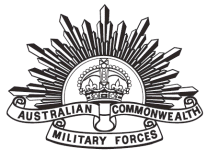

| Regimental number | 2233 |
| Place of birth | Sydney, New South Wales |
| School | Dorcas Street State School, South Melbourne, Victoria |
| Religion | Church of England |
| Occupation | Driver |
| Address | 185 Bank Street, South Melbourne, Victoria |
| Marital status | Single |
| Age at embarkation | 35 |
| Height | 5' 6.875" |
| Weight | 142 lbs |
| Next of kin | Mother, Mrs S A Pegler, 185 Bank Street, South Melbourne, Victoria |
| Previous military service | Nil |
| Enlistment date | |
| Place of enlistment | Melbourne, Victoria |
| Rank on enlistment | Private |
| Unit name | 6th Battalion, 6th Reinforcement |
| AWM Embarkation Roll number | 23/23/2 |
| Embarkation details | Unit embarked from Melbourne, Victoria, on board HMAT A62 Wandilla on |
| Rank from Nominal Roll | Private |
| Unit from Nominal Roll | 60th Battalion |
| Fate | Killed in Action |
| Age at death from cemetery records | 35 |
| Place of burial | No knowngrave |
| Commemoration details | V.C. Corner (Panel No 22), Australian Cemetery, Fromelles, France |
| Panel number, Roll of Honour, Australian War Memorial | 170 |
| Miscellaneous information from cemetery records | Parents: George and Sarah Ann PEGLER, 185 Bank Street, South Melbourne. Native of Surry Hills, New South Wales |
| Other details |
War service: Egypt, Gallipoli, Western Front Joined 6th Bn, Gallioli, 6 August 1915. Wounded (injury not stated), 7 August 1915, and admitted to No 2 Field Ambulance; transferred to 15th Stationary Hospital, Mudros, 8 August 1915; discharged to Convalescent Camp, 11 August 1915; admitted to 24th Casualty Clearing Station, 11 August 1915 (contusion, hip and back); discharged (Class A), 17 August 1915; rejoined Bn, Gallipoli, 19 August 1915. Admitted to 2nd Field Ambulance, 30 September 1915, and transferred same day to 2nd Australian Stationary Hospital, Lemnos; to Convalescent Depot, 21 October 1915; to Lowland Casualty Clearing Station, 5 November 1915, and discharged same day to Base Depot; rejoined 6th Bn, Gallipoli, 14 November 1915. Disembarked Alexandria, 7 January 1916 (general Gallipoli evacuation). Transferred to 58th Bn, 17 February 1916. Transferred to 60th Bn, and taken on strength, Tel el Kebir, 15 March 1916. Admitted to 2nd Australian Casualty Clearing Station, Ferry Post, 31 March 1916 (corns); discharged to duty and rejoined Bn, 17 April 1916. Embarked Alexandria to join the British Expeditionary Force, 18 June 1916; disembarked Marseilles, France, 29 June 1916. Reported Missing, 19 July 1916. Court of Enquiry, held in the field, 4 August 1917, pronounced fate as 'Killed in Action, 19 July 1916'. Note, Red Cross File No 2130102: 'No trace Germany[.] Cert. by Capt. Mills 10-10-19.' Statement, 2191 Pte J.L. THOMAS, B Company, 60th Bn (patient, 3rd Australian Auxiliary Hospital, Dartford, England), 28 November 1916: 'Witness states Pegler was struck in the shin by a fragment of shell which broke his leg. He was on no-man's-land Fleur Baix (sic) when it happened and Witness was two or three yards from him when it happened. Pegler called out that his leg was broken. He was taken away to the Dressing Station and witness does not know what became of him after.' Second statement, 2557 Pte R.J. ALFORD, B Company, 60th Bn, 28 February 1917: 'Pte Joe Dawson, B. VI, told me soon after he came out of the charge at Fleurbaix on 19th July, that he had seen Pegler's dead body lying in No Man's Land.' Third statement, 3622 Pte A.W. ROSS, 60th Bn, 23 July 1917: 'I knew Casualty well. He was in the next tent to me. He went over the parapet at Fleurbaix on the 19th July in the 3rd wave with me. Casualty was shot in the leg by machine gun bullet, about 40 yards from the parapet and dropped down, and was unable to move. I was wounded about the same time further on. I crawled over towards him and asked him whether he was wounded. We were separated by the ditch. He told me he had been first hit in the leg by a bullet, and that after an hour and a half had elapsed a shell burstnear him which wounded him in the arm, back and shoulder. He could move his head, and that was why I asked him whether he thought he could crawl back to our lines. His voice was very weak, and he replied "I think I am done for." This conversation took place at the ditch which separated us. Six hours later I crawled over the ditch to the spot where he was lying. I spoke to him, but received no reply. I tried to arouse him, and felt his hand. It was cold. He was dead.' Medals: 1914-15 Star, British War Medal, Victory Medal |
| Sources | NAA: B2455, PEGLER Joseph
Red Cross File No 2130102 |